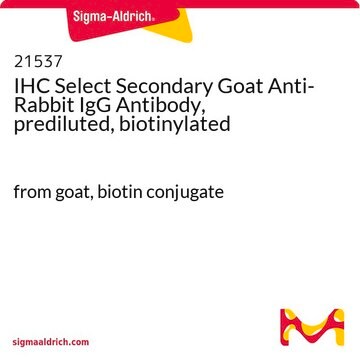MABF2107
Anti-Chlamydial LPS Antibody, clone EVI-H1
clone EVI-H1, from mouse
Synonyme(s) :
Chlamydial lipopolysaccharide, Chlamydia trachomatis LPS
About This Item
Produits recommandés
Source biologique
mouse
Forme d'anticorps
purified antibody
Type de produit anticorps
primary antibodies
Clone
EVI-H1, monoclonal
Espèces réactives
bacteria
Conditionnement
antibody small pack of 25 μg
Technique(s)
electron microscopy: suitable
immunocytochemistry: suitable
immunofluorescence: suitable
western blot: suitable
Isotype
IgG2a
Modification post-traductionnelle de la cible
unmodified
Description générale
Spécificité
Immunogène
Application
Immunocytochemistry Analysis: A representative lot detected Chlamydial LPS in Immunocytochemistry applications (Wolf, K., et. al. (2001). Infect Immun. 69(5):3082-91).
Electron Microscopy Analysis: A representative lot detected Chlamydial LPS with Trasnsmission Electron Microscopy applications (Wolf, K., et. al. (2001). Infect Immun. 69(5):3082-91).
Inflammation & Immunology
Qualité
Western Blotting Analysis: 2 µg/mL of this antibody detected Chlamydial LPS in HeLa cells infected with chlamydia trachomatis serovar L2 (LGV 434 L2).
Description de la cible
Forme physique
Stockage et stabilité
Autres remarques
Clause de non-responsabilité
Vous ne trouvez pas le bon produit ?
Essayez notre Outil de sélection de produits.
Certificats d'analyse (COA)
Recherchez un Certificats d'analyse (COA) en saisissant le numéro de lot du produit. Les numéros de lot figurent sur l'étiquette du produit après les mots "Lot" ou "Batch".
Déjà en possession de ce produit ?
Retrouvez la documentation relative aux produits que vous avez récemment achetés dans la Bibliothèque de documents.
Notre équipe de scientifiques dispose d'une expérience dans tous les secteurs de la recherche, notamment en sciences de la vie, science des matériaux, synthèse chimique, chromatographie, analyse et dans de nombreux autres domaines..
Contacter notre Service technique







